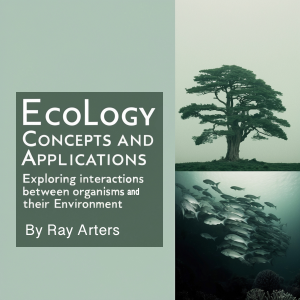

Ecology
Ray Arters
This audiobook is narrated by a digital voice.
Ecology represents the scientific study of the interactions between organisms and their environment, encompassing the complex relationships that govern the distribution and abundance of life on Earth. This discipline emerged from the recognition that no organism exists in isolation, but rather each species participates in an intricate web of relationships with other organisms and the physical environment that shapes the very fabric of life on our planet.
The foundations of ecological thinking can be traced to early naturalists who observed patterns in nature and began to question why certain species occurred in particular places and how they interacted with their surroundings. Alexander von Humboldt's pioneering work in the early 19th century established the conceptual framework for understanding how climate, geography, and biological factors combine to create distinct patterns of life across the globe. His observations of how species composition changed with elevation in tropical mountains laid the groundwork for understanding ecological gradients and the environmental factors that control species distributions.
The term "ecology" itself was coined by German biologist Ernst Haeckel in 1866, derived from the Greek words "oikos" meaning house or dwelling place, and "logos" meaning study. Haeckel envisioned ecology as the comprehensive science of the organism's relationship to the environment, including all conditions of existence. This broad definition encompasses everything from the molecular mechanisms by which organisms respond to environmental stress to the global patterns of energy flow and nutrient cycling that sustain life on Earth.
Duration - 44m.
Author - Ray Arters.
Narrator - Digital Voice Matt G.
Published Date - Friday, 24 January 2025.
Copyright - © 2025 Ray Arters ©.
Location:
United States
Description:
This audiobook is narrated by a digital voice. Ecology represents the scientific study of the interactions between organisms and their environment, encompassing the complex relationships that govern the distribution and abundance of life on Earth. This discipline emerged from the recognition that no organism exists in isolation, but rather each species participates in an intricate web of relationships with other organisms and the physical environment that shapes the very fabric of life on our planet. The foundations of ecological thinking can be traced to early naturalists who observed patterns in nature and began to question why certain species occurred in particular places and how they interacted with their surroundings. Alexander von Humboldt's pioneering work in the early 19th century established the conceptual framework for understanding how climate, geography, and biological factors combine to create distinct patterns of life across the globe. His observations of how species composition changed with elevation in tropical mountains laid the groundwork for understanding ecological gradients and the environmental factors that control species distributions. The term "ecology" itself was coined by German biologist Ernst Haeckel in 1866, derived from the Greek words "oikos" meaning house or dwelling place, and "logos" meaning study. Haeckel envisioned ecology as the comprehensive science of the organism's relationship to the environment, including all conditions of existence. This broad definition encompasses everything from the molecular mechanisms by which organisms respond to environmental stress to the global patterns of energy flow and nutrient cycling that sustain life on Earth. Duration - 44m. Author - Ray Arters. Narrator - Digital Voice Matt G. Published Date - Friday, 24 January 2025. Copyright - © 2025 Ray Arters ©.
Language:
English
Ecology
Duration:00:44:15